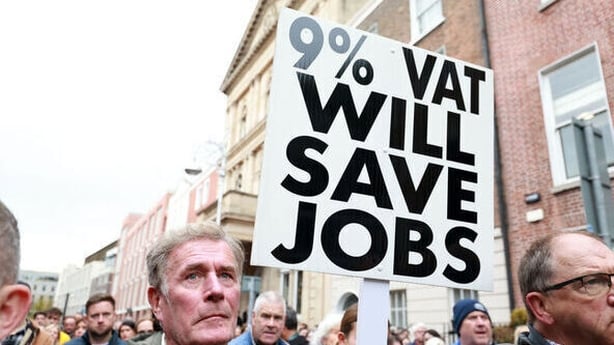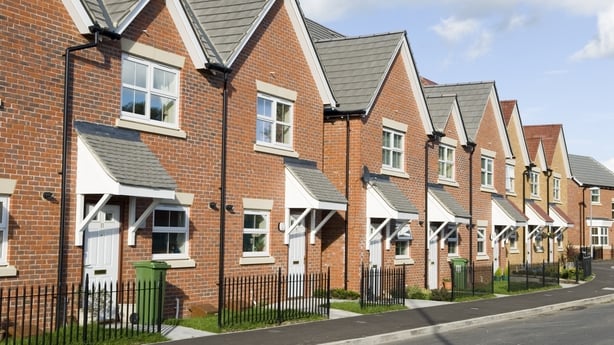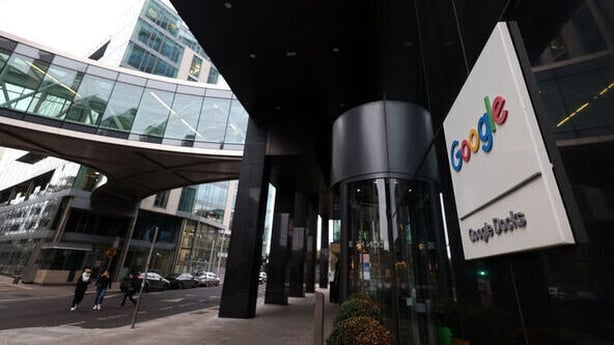The starting gun has been fired on the campaign for Election 2024. But in reality, among the business community at least, campaigning got under way months ago.
Even before the outgoing government had a chance to deliver its final budget, some of the main business representative organisations had already begun publishing their election manifestos or wish lists.
There are several recurring themes. So, what is it that they are looking for?
Action on costs
At the Small Firms Association annual lunch in Dublin on Friday, the mood was upbeat.
But the main topic of conversation among the several hundred attendees was costs.
The issue of high and in some cases crippling business costs has been a significant one for quite some time.
It began in the wake of the pandemic, as creaking supply chains coupled with resurgent demand led to shortages of raw materials, feeding through to high prices, just as government Covid-19 supports were being withdrawn.
Added to that was Russia's invasion of Ukraine, which drove energy prices skyward, again taking away from businesses’ bottom line.
A raft of Government policy changes then got lumped in too, with increases in the minimum wage, statutory sick pay entitlements, an additional public holiday, a plan for pension auto-enrolment, improved parents leave and benefit, and a right to request remote working.
The net result of it all has been rocketing costs for firms that business owners and managers have cried out for help with.
Nowhere has the pressure been felt more acutely than among hospitality, tourism, retail and other small firms.
In the case of many of them, the ending of the 9% special VAT rate last year, was a further kick in the teeth.

The refusal of the Government to backtrack on that in the Budget, because it would have cost up to €764m a year to do so, prompted hospitality sector business owners and staff to take to the streets in protest.
The Government did roll out various initiatives to try to ease some of the cost burden, like the Temporary Business Energy Support Scheme, Increased Cost of Business Scheme and the latest, the Power Up grant.
But varying degrees of take up were reported for each and even then, many businesses felt the assistance wasn’t nearly enough.
Most recent data from PwC shows insolvencies are up 35% so far this year compared to the same period last year, as the issue bites.
Expect, therefore, politicians to get an earful on the doorsteps from business owners about the cost environment and strong calls for more action to help firms with it.
"A review of employment legislation is also essential to balance worker protections with the need for flexibility in a challenging economic environment," said Chambers Ireland in its election manifesto.
Latest stories on Election 24 here
"Additionally, the rigorous application of the SME test and the 'think small first’ principle in policymaking is critical to ensuring that the needs of smaller businesses are considered and supported, allowing them to thrive amid complex challenges."
But small business owners will also be looking for more, in particular signs that the next administration is prepared to back them to scale and grow.
This will require access to finance, enhanced tax incentives, support for R&D and help with upskilling.
Infrastructural deficit
Another regularly recurring theme in the election asks of firms is for infrastructural deficits to be addressed.
Chief among them, of course, is housing.
Businesses rely on a steady supply of staff and those workers, whether they are originally from Ireland or from overseas, need somewhere to live.
The housing crisis is therefore posing a major difficulty for organisations trying to attract, recruit and retain employees, leading some like Ryanair, Supermac’s and Ashford Castle to name but a few, to invest in their own staff accommodation instead.
"A significant increase in infrastructure and housing investment will be necessary," ISME wrote in its pre-election vision.
"The Government must incentivise private sector investment to increase rental accommodation supply, having a greater impact on affordability."

But housing is just one area of worry. Energy - both the cost of and the security of supply of - is another headache for many firms.
The Ukraine war has shown up our vulnerability when it comes to guaranteed supply.
While research published by BusinessEurope in July found Ireland’s energy prices over the coming years could be significantly higher than in other European countries.
Progress is being made in the upgrade of the national grid, on interconnection and in the development of offshore and onshore renewable energy solutions, which should in time help address the issues of both cost and security of supply.
Firms want to see it happen quicker though, which requires funding, speedier planning decisions and minimal red tape.
"The country needs an energy strategy which can balance the decarbonisation imperative with both competitiveness and security of supply requirements," Ibec said in its election manifesto.
"An ambitious energy strategy which seeks to maximise Ireland’s exceptional potential for renewable electricity generation would deliver a competitive edge for the economy for years to come.
"It would spawn new enterprise development and crucially, as energy consumption must shift closer to the location of renewable generation, it can be a game changer for effective regional development."
Water (both drinking and waste), transport and more, are all also on the list of infrastructural priorities businesses are seeking the delivery of, in a balanced regional way.
"Problems with congestion have plagued the greater Dublin area for many years," said Dublin Chamber.
"Commencing work on public transport projects that have been in planning and consultation for far too long will go some way to get people moving efficiently."
Multinationals
While just 3% of enterprises in Ireland are owned by foreign multinationals, they account for 71% of the total turnover and 27% of all employment, employing 623,000 people, according to the latest data from the Central Statistics Office.
And of the €23.8bn in corporation tax taken in last year, a whopping €19.9bn or 83.8% came from foreign owned multinationals operating here.
It is reasonable to assume then that ensuring they continue to not only stick around but also invest here, will be an election issue for those involved in the sector.
Foreign Direct Investment has already been strained in recent times, due to increased competition from other states, geopolitical uncertainty and the difficult global economic environment.

But things became all the more uncertain in recent days with the emphatic win by Donald Trump in the US Presidential election.
Amid his pledge to cut corporation tax and increase tariffs in order to keep US firms at home, those working for or dependent on US multinationals will be looking for signs that political parties have their interests in mind.
The aforementioned costs, competitiveness and infrastructure are among the issues that the broader multinational sector will want to see action on by the next Government.
But they will also be looking for signs that those who next hold the reigns of power have a vision for a pro-business environment.
They will also be seeking commitments around ensuring the workforce remains skilled and plentiful, through education and training, particularly at third and fourth level.
"Our continued investment in education and training remains critical across a broad spectrum of third level institutions and qualifications, apprenticeships and most importantly lifelong learning," Chambers Ireland said in its manifesto.
Commitments around the simplification of regulation and improvements to the tax system for corporations are also likely to be high on the priority list, with research and development a big focus.
"Simplifying and expanding existing schemes aimed at promoting business growth is necessary to ensure they work effectively and allow for higher uptake among businesses," Ibec said.
"In an increasingly competitive global environment, ensuring Ireland is an attractive place to start and scale business will safeguard our prosperity into the future."
But there are also calls for changes for taxes on workers.
The Irish Tax Institute wants to see a reduction in the marginal personal tax rate to 50%, reform of PRSI and a broadening of the tax base so that all taxpayers contribute according to their means.
A principle few businesses or individual taxpayers are likely to argue with.






